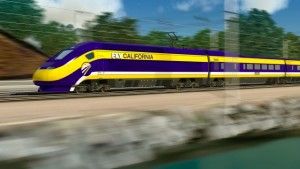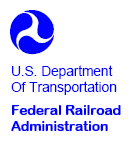Feds give CA breathing room on bullet-train matching funds
by Kathy Hamilton | February 26, 2014 8:35 pm

There’s been another funding twist for the California bullet-train project. The Federal Railroad Administration has agreed to delay the due date for $180 million in state matching funds for the project from April 1 to July 1, according to a press release[1] from Rep. Jeff Denham’s office.
This gives Gov. Jerry Brown and the California High-Speed Rail Authority breathing room to work with the Legislature and try to convince lawmakers to allocate $250 million in state cap-and-trade auction revenues for the rail project.
Denham, a Turlock Republican, considers the move risky. This is from his Feb. 21 press release:
“The Federal Railroad Administration [FRA] is protecting the Authority yet again and putting California taxpayers at greater risk. It has long been clear that the Authority would be unable to provide the funds required in their grant agreement. In December 2012, the FRA changed their agreement to allow for a tapered match rather than the standard concurrent match. Now they’ve changed the agreement again. With billions in federal taxpayer dollars on the line, what changes are next from the FRA? The American people – and Californian taxpayers – deserve to see their money used responsibly.”
But there are also additional important changes in the federal funding agreement outlined in the letter[2] that rail authority CEO Jeff Morales released Feb. 20. The new funding contribution plan shifts a large amount of funding responsibility in coming years to the federal government, with a significant decrease in California’s contribution compared with the original plan, according to bullet-train financial expert William Warren. (Along with William Grindley, Warren has co-authored numerous briefing papers[3] regarding rail-authority data.)
U.S. taxpayers at risk for single-state project
These changes leave the U.S. taxpayers in all 50 states with more exposure while pushing a troubled, legally questionable California state project forward.
 The state has been receiving federal funds upfront for planning and environmental work for the past year, with the state’s required match delayed until later. The original funding plan required a simultaneous match, according to a May 25, 2011, letter to the state from Roy Kienitz, who was then undersecretary of policy for the U.S. Department of Transportation. “On the matter of using federal funds up front to postpone use of the State’s matching funds, we hope you will understand why this is not feasible,” Kienitz wrote. ” Both the fiscal year 2010 appropriations law and the FRA grant commitments require matching funds as a prerequisite for this project to go forward. California was awarded funding based in part on the impressive state match promised in the grant applications. Withholding these matching funds would put the California’s high-speed rail project in serious jeopardy.”
The state has been receiving federal funds upfront for planning and environmental work for the past year, with the state’s required match delayed until later. The original funding plan required a simultaneous match, according to a May 25, 2011, letter to the state from Roy Kienitz, who was then undersecretary of policy for the U.S. Department of Transportation. “On the matter of using federal funds up front to postpone use of the State’s matching funds, we hope you will understand why this is not feasible,” Kienitz wrote. ” Both the fiscal year 2010 appropriations law and the FRA grant commitments require matching funds as a prerequisite for this project to go forward. California was awarded funding based in part on the impressive state match promised in the grant applications. Withholding these matching funds would put the California’s high-speed rail project in serious jeopardy.”
Kienitz left the agency and, within a year, joined Parson Brinckerhoff, the primary consultant on the high-speed rail project. Shortly thereafter, in 2012, a revised federal funding plan — the fifth version — was published. It said the federal funds could be spent first and matching state bond funds could be spent starting in April 2014.
It had been expected that the rail authority would have access to state bond funds by April 2014, but two November court decisions[4] by Sacramento Superior Court Judge Michael Kenny dashed those hopes. The judge found the state had failed to meet its legal obligation under Proposition 1A to identify firm funding and complete environmental reviews for the entire initial operating segment of 300 miles before beginning construction. He also ruled the state could not begin selling state bonds funded by the proposition because they had not followed procedural safeguards related to bond sales.
State wants strings taken off some federal funds
Morales has also asked for a shift of $145 million in federal funds from construction to the planning and environmental category. The feds had construction dollars in their funding agreement with the state, but the rail authority had to get specific permission to use those funds. Judge Kenny’s rulings effectively halted the spending of state bond funds for construction, but they did not forbid the spending of federal funds — even for construction.
This request for the shift of funds might be because the Federal Railroad Administration usually releases grant funds as a project progresses, a little at time. The authority is not ready for construction yet and needs more funds to move the project forward. It also has a lot of old bills to clear up — $63 million, it was revealed at the rail authority board’s Feb. 11 meeting.
 In his letter to the FRA, Morales wrote that the authority does not anticipate using state Proposition 1A funds until July 1, 2015. It is not explained whether that is because the authority doesn’t think it will need the state funds until then or because that’s when officials expect the funds to become available after legal challenges are resolved. But the American Recovery and Reinvestment Act of 2009 (ARRA) requires all federal funding to be used by September 2017 or the state will forfeit unspent funds.
In his letter to the FRA, Morales wrote that the authority does not anticipate using state Proposition 1A funds until July 1, 2015. It is not explained whether that is because the authority doesn’t think it will need the state funds until then or because that’s when officials expect the funds to become available after legal challenges are resolved. But the American Recovery and Reinvestment Act of 2009 (ARRA) requires all federal funding to be used by September 2017 or the state will forfeit unspent funds.
While the governor wants to use cap-and-trade dollars as a state source of funding, only the Legislature can approve an appropriation. Many lawmakers appear to question the legality of using cap-and-trade fees for the bullet train. Environmental groups[5] also object.
Nevertheless, Dan Richard, chairman of the rail authority board, said at a Jan. 15 House transportation committee hearing that he had promising talks with environmental groups on using the cap-and-trade funds for the rail project.
Meanwhile, above and beyond the maneuvering on federal and state funding, the 3rd District Court of Appeal[6] is now reviewing the Nov. 16 decision by Judge Kenny requiring the authority to rescind its funding plan. The appeals court is reviewing the ruling at the direction of the California Supreme Court, which was asked by the Brown administration to expedite a review of the ruling because of the administration’s contention that Kenny’s decision imperiled the project.
- press release: http://denham.house.gov/press-release/denham-responds-fra's-latest-high-risk-adventure
- letter: http://www.hsr.ca.gov/docs/about/funding_finance/funding_agreements/FR-HSR-0009-10-01-005_FCP.pdf
- numerous briefing papers: https://www.sites.google.com/site/hsrcaliffr/home/briefing-papers/01-2014-fleecing-local-high-speed-train-riders
- court decisions: http://www.examiner.com/article/court-instructs-hsr-to-redo-funding-plan-refuses-to-validate-state-bonds
- Environmental groups: http://abclocal.go.com/kfsn/story?id=9388902
- 3rd District Court of Appeal: http://www.examiner.com/article/high-speed-rail-rule-of-law-vs-sheer-political-will?cid=db_articles
Source URL: https://calwatchdog.com/2014/02/26/ready-feds-give-ca-breathing-room-on-bullet-train-matching-funds/